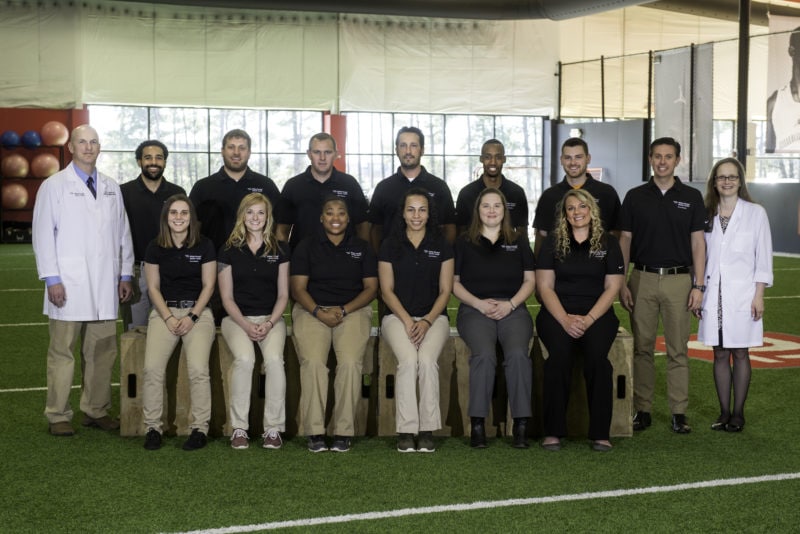The 4 People Who Can Help Your Child Avoid Sports Injuries
By Christopher Ina, MA, LAT, ATC, Athletic Training Coordinator for Wake Forest Baptist Health
Participating in sports is a great way for your child to have fun and build valuable life skills, like teamwork and discipline. Sports can also benefit your child physically, helping him or her to develop strength, coordination and overall fitness. And while most sports are generally safe, any physical activity comes with the risk of injury. Types of injury vary from child to child and sport to sport, and they can range from ankle sprains to concussions to heat exhaustion—and many things in between.
Fortunately, there’s a team of people who can help reduce your child’s risk of injury. They include:
- You
You may not realize it, but you play a big role in helping your child avoid sports injuries. You should make sure your child has all of the proper equipment necessary for his or her sport, and that any protective gear or clothing fits well. You can also help your child avoid injury by ensuring he or she is well nourished and well hydrated.
When your child’s sport is not in season, you should help him or her stay in shape. For younger children, this can mean letting them run around and play outside; for teens, it can mean encouraging them to focus on stretching and lifting weights. Ongoing physical activity is important because it promotes fitness and coordination, which can help prevent falls and other accidents.
Finally, pay attention to your child. If he or she isn’t feeling well or complains about an injury, seek medical care, if necessary.
- Your Child’s Coach
You should also be aware of how your child is being coached. Each sport has its own safety standards and regulations, so be sure your child’s coach is properly trained in the sport he or she is coaching. Go to practices to watch how they’re being conducted and to talk with the coach and other parents. Keep an eye on whether your child is being taught safe, proper techniques and drills.
If your child plays football, it’s important that he is being taught not to tackle with his head down. (You can learn more about the Heads-Up campaign at www.cdc.gov/headsup.) If your child is a cheerleader, make sure her coach is conducting practice on a padded or spring floor, rather than a basketball court or outdoor surface.
Whatever the sport is, coaches should always have adequate hydration available for athletes, have access to first-aid supplies and offer opportunities for rest—particularly in high temperatures.
- The School’s Athletic Trainer

If you have a teenager who participates in a high-school sport, it’s very likely he or she has access to an athletic trainer. In Forsyth County, every high school has at least one. Athletic trainers are not only able to advise on safe techniques and practices, they can also recognize and evaluate injuries when they happen.
It’s good for there to be an athletic trainer at every practice and game; they are the first line of defense when a teen athlete is injured. If it is a minor injury, such as a sprain, the athletic trainer can help treat it and determine whether it needs to be seen by a medical professional. If it is a more serious injury, the athletic trainer can provide a referral to the right doctor or specialist.
- Your Child
Children, especially younger children, can’t always be held accountable for preventing injuries, but they do have a role to play. Any child athlete should be taught the proper safety techniques of his or her sport—as well as any general precautions, like staying hydrated. As your child grows older, he or she will become more responsible for remembering and applying this knowledge.
When it comes to preventing or being treated for injuries, it’s also important that children and teens are open and honest with parents, coaches and medical professionals about how they’re feeling. If something hurts, they need to be forthcoming about it.
When everyone involved—you, your child’s coach, the school’s athletic trainer and even your child—are all aware of safety precautions, your child will be less likely to experience sports-related injuries.
 With school fall sports season upon us, Wake Forest Baptist Health is providing a free booklet full of nutrition, conditioning, and recovery tips, designed to help keep student athletes healthy and injury-free. Download your free guide, full of expert information. For more information, click here.
With school fall sports season upon us, Wake Forest Baptist Health is providing a free booklet full of nutrition, conditioning, and recovery tips, designed to help keep student athletes healthy and injury-free. Download your free guide, full of expert information. For more information, click here.
- Sponsored by Wake Forest Baptist Health
